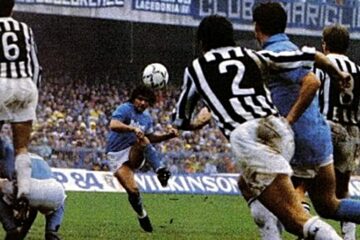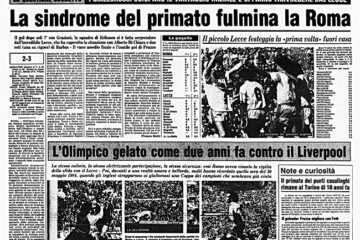Football in Wartime | The strange challenge between the resistance Partisans and the Nazis!!!

The match between the partisans of the Italian resistance and the German Nazis of the 2nd regiment of the “Brandenburg” Division!!!
What we will tell below is a strange event, maybe it has the form of a legend but in reality it carries within itself the drama of a football match, a challenge for life and death between the partisan forces of the Italian locality of Sarnano and the soldiers of the Wehrmacht -it!
Dear reader, we have not undertaken to tell fairy tales, nor the script of any movie with sports themes, but rather a true event that happened in April 1944. A race organized and heroically led on the field by a professional referee, precisely by Mario Maurelli, in Sarnano, as children we often liked to ski up there in the Sibillini snow.
Paolo, the best hunter of the group, one evening in a local tavern had told one of those events that have been broadcast for years in the smoky sports bars in the towns of the Umbria-Marche Apennines:
“The legend of Sarnano” !!!
A history of football and resistance to the Nazi-fascist regime, which happened in this locality of the Macerata area (more or less with 3 thousand inhabitants) in the spring of 1944. But there are those who give an exact date of that “escape” multiple. for the victory. If this event, the story of Sarnano’s match, instead of an article, was a film, it would continue with a very long shot sequence which would start from above, flying over the fascinating locale, then slowly the camera would stop on a soccer field, a miniature stadium, nestled between the Sibillini Mountains and the city’s public parks. This field was inaugurated in 1932 in the presence of the prefect and hierarchs of the province. The field was named “Della Vittoria”.
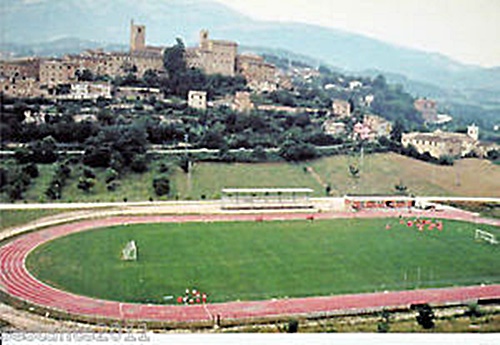
To this day, the invitation poster for the ceremony is kept in the municipal library of Sarnano, where it can be read “that unexcused absences will not be tolerated”.
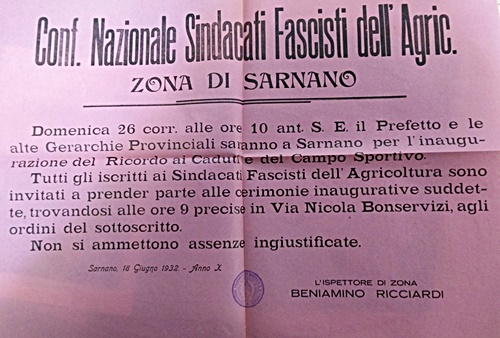
It was the noisy years of the fascist regime, which in that period, in fact, had reached the peak of consensus. Nothing, therefore, suggested the abyss into which the country would fall. By 1944, things had changed dramatically. In central and northern Italy a tragic conflict was taking place between the Nazis and Fascists on the one hand and the Partisans on the other. The Allies, who landed in Sicily almost a year ago, were moving slowly up the beautiful peninsula and had been halted at Montecassino since January.
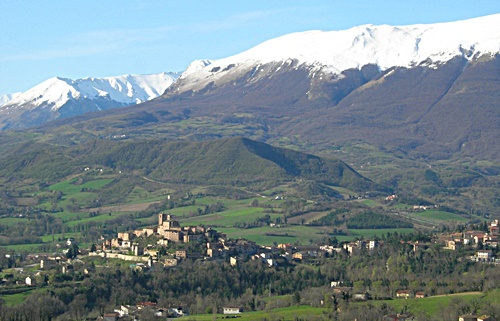
It’s April 1, 1944!!
Precisely in this small stadium of the city behind the church of San Filippo, on Saturday morning, the Germans had already descended on the field, ready for the challenge, while little by little the Italian partisans who had been called, quickly descend from the mountains…”, so writes Rosario Esposito La Rossa, a Neapolitan author, in his book “Eternal Seconds”. He is also a publisher and bookseller in Scampia. This is the prologue of the most hectic 90 minutes that a hero of the black jerseys has ever experienced: referee Mario Maurelli “sentenced”, for that day, to live… Defeat is a wonderful adventure. In this case the loss was a forced draw. But let us return with a vivid memory to those dark and chaotic days of the Nazi occupation in Sarnano. It was a time of clandestine tournaments, called “war championships” (the one of ’44, won by the “La Spezia” Fire Brigade).
Mario Maurelli, the football referee since 1937, was facing his toughest match yet. He knew well the traps and pitfalls of this fierce and sometimes cruel war that was consuming the whole country. He walked back and forth, dominated by anxiety, through the rooms of his house. After September 8, there was no hesitation. He had sided with the GAP (Partisan Action Groups) where his brother Mimmo was active, where he had taken refuge, like many others, in the Apennines. “Ex-soldier of the royal army, who after helping in the ruins of the bombing of San Lorenzo, in Rome, took refuge in the Apennines together with other partisans and ex-soldiers”, this is how Mimmo appears in the book “Eternal Seconds” . Therefore, when the two Wehrmacht officers went to knock on the door of Maurelli’s house, the referee thought that he was now close to capitulation, ready to go to the gallows, together with his brother. And instead, he sighed with relief when asked: «Are you Judge Maurelli? ». The two Germans had learned of his excellent refereeing record and asked for his support in organizing a football match between their team and the home team. Look, look what happened to us – Mourelli thought – these Germans wanted to organize a football match. And they wanted him to be the organizer of the match. But how? All the young men of the city were hidden in the Sibylline caves, armed and ready to defend themselves to the last bullet.
They were part of the Val Fiastre brigade, led by Decio Filipponi, a heroic commander who, the day after the killing of two German soldiers, surrendered to the enemy to avoid reprisals and revenge against the civilian population. The generous gesture did not move the Nazis who hanged him on March 29, 1944. His body was exposed for a week in the square of Piobbico di Sarnano.
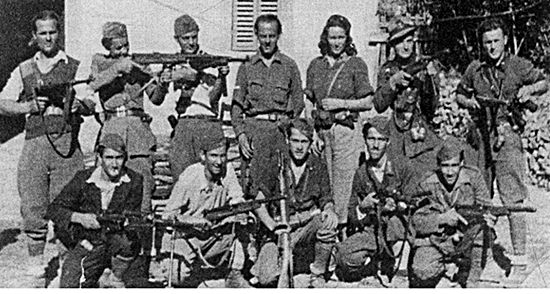
And even further, to revive optimism in their ranks, the German officers demanded a match and a “corrective” victory on the football field. Yes, because the war was raging in Europe and the morale of the soldiers at the front, away from home and families for years, was getting lower and lower.
A depression that was no longer fitting for an army that was already smelling the unmistakable smell of defeat. And the only attempt to “normalize” the situation could be football. This must have been the thought of the high-ranking German officer, who with his men had surrounded Sarnano, a small locality located in the Macerata hills occupied by the Reich. Passionate about football, the German officer asked Judge Maurelli, also known in Germany, to create a team that could challenge the eleven of the II regiment of the “Brandenburg” division. The only rule of this gathering: all players must be Italian and all the same age as their opponents. Referee Maurelli was ordered to recruit, or rather “collect” a team worthy of a unique and certainly unrepeatable match. A challenge to play to death, almost certainly.
The match had to be played and the Nazi officer, whose part they had no reason to threaten with death, on the contrary, this time promised them in his honor as a soldier that the Italian players, the partisans and the “illegals”, would not be “a hair” touched, on the contrary, they would avoid any deportation. Furthermore, at the end of the race, they would be offered refreshments, naturally at the expense of the Reich.
To good to believe it.
Obviously, organizing this match was a difficult mission. Maurelli was struggling with a thousand doubts: what if it was a trap? He thought with horror! What if I can’t find eleven players available? He had to collect his brother, Mimon, in this formation, despite the fact that he was wanted as an “illegal” by the Nazi-fascists. Otherwise others would accuse him of wanting to protect her.
For Maurel, who was a man respected by all, to make a deal with the Nazis, even for a football game, meant disrespecting those who fought and died every day to drive out the invaders. After the news spread in the city, the locals did not like it at all and Maurelli was asked to resign. In addition, Sarnano’s Italian team would also include some partisans who had settled in the surrounding hills, as well as deserters from the royal army.
This meant, in short, to serve them all as an appetizer to the Nazis. Mario, in the end, convinced himself that it was better to try to develop this challenge. On the other hand, the German officer who had knocked on his door told him clearly and loudly that he was not interested in taking advantage of the match to capture a large gathering of partisans. So Mourelli sat down at the table and tried to draw up a starting list. It was necessary to contact the ‘runaways’ and so a long distance meeting took place through some kind of code word.
After all, it was not an easy matter. In this case, the greatest resistance came from the mothers, especially those whose sons had hidden in the mountains: “Don’t accept it, it’s a trap! They will kill you all”, the mothers begged them. Maurelli managed to track down and convince the boys who thus created a regular eleven, as requested by the Germans, where (“as a guarantee”), his brother Mimmo would also be. At the end of a very turbulent negotiation, the list of names was reached. Santucci, porter, famous acrobat; the Moretti brothers, Amintore Lucarelli, the full-back and the boy who owned the shop, then Gregucci, Di Nola, Mimmo Maurelli and Grattini. As for the Germans, however, a list of names has never been found, not even a partial one, of the Wermacht soldiers who played in this match.
The only thing certain is that the German formation consisted of soldiers stationed in the garrison of Sarnano. It was mainly about “Alpenjäger”. From some sources it turned out that they were soldiers belonging to the II Regiment of the Brandenburg Division, special units used in actions against guerrillas. These soldiers, however, were not Germans, but South Tyroleans. In fact, they spoke Italian well. However, in the end one name was found from the group: a certain Walter Kobler. And the day of the challenge came. Sunday, April 1, 1944. The two teams met in the afternoon at the “Della Vittoria” sports field, which stood in the shadow of the bell tower of Santa Maria Assunta, a thirteenth-century church.
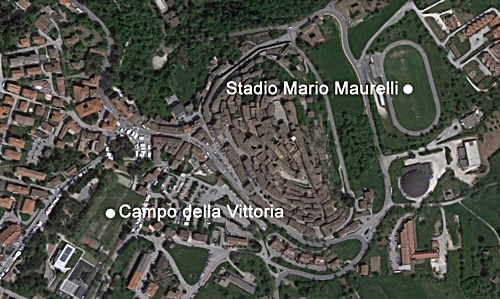
The playing field is, of course, already occupied by German soldiers.
But who was in the stands of the small stadium? The evidence agrees: there was quite a large audience. It consists mainly of women: mothers, sisters or cousins of the Sarnanese youths in the field. The massive presence of female support is easily explained. The men were in the mountains or scattered across the various war fronts in Europe.
The partisan team appears suspicious and fearful. Murelli became the first referee in history who was told not to give in to the temptation to beat the German team. “If we want to save our skins, you must not win today,” was his stern order. “Actually, if you really want me to tell you all about it, you’d better get lost today if you want to save your skin.” The fear of winning, in the most authentic sense of the word, went to the backs of similar footballers. But in sports as in war, planned actions don’t always turn out well. Apparently, the message was not conveyed enough to the boys.
As the resistance players moved onto the field, the cruel images of the German reprisals, the burning houses, the body of the commander Decio Filipponi hanging on the gallows, in the Piazza di Piobbico, flowed through the minds of Sarnano’s players. At that moment, surely, the anger that had been dormant for the last few years produced what we can definitely define as a desire for revenge.
We should at least teach these Nazis a soccer lesson. The thought that crossed the mind of the eleven in Saernano is only one: a little revenge for Commander Decio and all the victims of Sarnano. After ten minutes of play, full-back Lucarelli sets off on a flank incursion. They understand each other well, and after reaching the corner flag, he sends a beautiful cross into the center of the opponent’s area, where Grattini heads, who jumped up like no one else there a spring.
The blow was inevitable. Maurelli hesitates to whistle and point in the center of the field. Perhaps at that moment he would have liked to swallow that whistle. He looks annoyed by Grattini……
-How the hell can I do it? Why are the boys playing with their lives like this? Did they understand what I told them? Shoul I sign a foul…..? Maybe an offside position? No, it is not “fixed” at all!
Goal! 1-0, for the partisan resistance formation!
The sports field in Sarnano is quiet. Maybe none of the local supporters “dare” or can’t enjoy the goal…….
The Germans now rush forward like mad, but are in no position to finish. As footballers they are clumsy and in some cases grotesque. This is how the first half ends and both opposing sides go to rest. The patriotic ego proudly resists even in the second half. Referee Maurelli must have repeatedly looked at his watch anxiously and met the angry gaze of his brother along with the entire team, who saw that challenge as a worthy rematch. “A goal for Commander Decio, a victory for all the victims of that absurd fratricidal war fueled by the banality of totalitarian evil”, it seems as if they expressed calmly. Maurelli once again reminded the players who they were playing against and to leave their patriotic pride. Returning to the field, Lucarelli, protagonist of the advantage, put an end to Maurel’s anxiety.
Five minutes from the end, the fragmentary chronicles of this “Legend” speak of a deliberate, voluntary slip. Reason, combined, perhaps, with a greater spirit of survival compared to the rest of the partisan formation, enlightened ex-soldier Libero Lucarelli, who accepted the desperate call – whispered between one foul and another – from the referee Maurelli.
He pretends to slide and allows the German striker to fly towards the goal defended by Santucci who in practice, as we would say today, dodges and… finally the Germans equalize. Goal! 1-1! Draw, with eleven lives saved, who immediately after finishing the race quickly ran away back into the mountains. “Flight towards victory”. Or more precisely “Victory” (in Italian “Fuga per la vittoria”). This is the title of a film that resembles this event but is actually dedicated to another event, the one remembered as ” The match for life and death”, another real event that happened in Kiev, Ukraine, right at the time of World War II and which we will talk about in our next story.
You have seen the film in question made in 1981 Real players from the 70s like Pele, Osvaldo Deina, Pol Van Himst and the famous actresses Silvester Stallone, directed by John E remember the scene when the Allied team ran off the pitch after Pelès’ goal that sealed the tie? Well, in Sarnano, that Sunday afternoon in 1944, something similar happened the ball up; a signal with which the resistance boys who were playing on the field seemed to have agreed. So the entire partisan formation followed the trajectory of the ball and ran towards the point of fall, like after a comet, and the sprint took them to the same hill from which they had descended. And there they disappeared without a trace.
Yet it was one of the few promises honored by the Nazis engaged on the opposite side in World War II, which left 55 million dead in Europe. Mario Maurelli wiped the cold sweat from his forehead for the danger he had already passed and was the only one in that event who participated in the “third part”, in the bitter refreshment offered by the Germans who in their hearts thought they had achieved a half victory . But the real winner of that day was only him, Mr. Maurelli, who, after the end of the war, was able to return to the management of real matches.
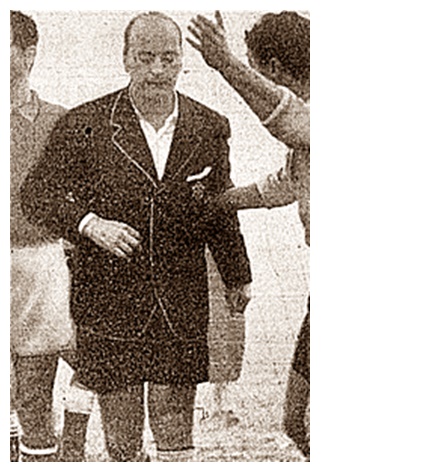
In his career as a professional referee he includes: 98 Serie A championship matches, from the football season 1945-’46 to ’57-’58. Among other things, he was an international referee, authoritative and honorable, who smiled when he had to remember events and episodes he had experienced on the field of play as a referee. In Palermo in a fiery derby Palermo – Catania, the Catania defender Marzano “was self-excluded” after Maurelli had warned him and even telling him: “now the next serious intervention will take you out directly with red.” In fact, he continued with heavy interference and I didn’t see the last of it, because I was in a covered position, but Marzano sportily left by himself in the dressing room.
At the time when the revolution was on fire in Hungary in ’56, the referee Maurelli in Naples left the field accompanied by the police because the atmosphere in the local stadium was too electrifying and not at all friendly due to the awarding of the penalty (in extra time beyond the 90th minute regular) against Bologna, for the final and “mock” draw 3-3! But the invasion of the field by the fans and everything that followed including the other episodes were “small” things (or rather the effect of small things compared to the Sarnano incident) for the man who had directed it with his head up and with extraordinary courage that challenge for life and death. A story of lives saved, which (more or less like the saying “the good that is done is not said”) Maurelli has never told, not even to his best student, the former international referee Carlo Longhi when he the latter had to say about his professor: “a master of the field and of life, a point of reference for all the managers of the matches of my generation”. Later some of his students went for a visit to Sarnano, the sports field that now bears his name, “Mario Maurelli”, a referee and true gentleman who passed away at the age of 86 on September 5, 2000 precisely in Sarnano.
Prose and stories have been written about the famous match. Umberto Nigri made a documentary titled “The Legend of Sarnano”. In 2021, director Stefano Monti shot a short film, Terzo Tempo (The Third Part), loosely inspired by the soccer match played in Sarnano in 1944. The short film tells the story of Mikele, a young referee football in charge of organizing the match. About this incredible story, we read a reflection that we would like to report at the end of our story: Some of those football players who in 1944, in Sarnano, ran away at the end of the match and disappeared in the surrounding hills, continue to they are still running around somewhere today… No one knows where they are going. We like to think that they run towards freedom, like the protagonist of a beautiful book by the Italian Antonio Tabuki, who says that literature should not be a shelter separated from reality, but a tool to understand the world and to modify it, if it is necessary. The way of writing itself must be a reflection of reality, to perform its true function.
By Pjerin Bj | The exclusivity on this page is dated March 14, 2024
___________________
Sports Vision + / The Hour of The Champions active since 2013
Reference : 1944 – La partita (RadioRai) / Documentary “Legend of Sarnano” (Nigri, Umberto/ “Il terzo tempo” (Monti , Stefano)
Discover more from Sports Vision +
Subscribe to get the latest posts sent to your email.


